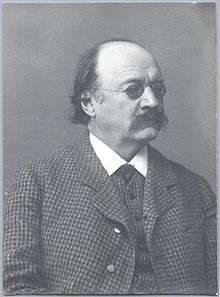Alexander Schmidt (physiologist)
| Alexander Schmidt | |
|---|---|
 | |
| Born |
1831 Muhu, present-day Estonia |
| Died |
22 April 1894 Tartu, present-day Estonia |
| Citizenship | Russian |
| Nationality | Baltic German |
| Fields | Physiology |
| Institutions | University of Tartu |
Hermann Adolf Alexander Schmidt (1831 – April 22, 1894) was a Baltic German physiologist from what was then the Governorate of Livonia in the Russian Empire. He was born on the island of Mohn, which is today known by its Estonian name Muhu, in present-day Estonia.
In 1858, he received his medical doctorate from the University of Dorpat, and later was an assistant to Felix Hoppe-Seyler (1825-1895) in Berlin, and to Carl Ludwig (1816-1895) in Leipzig. In 1869 he succeeded Friedrich Bidder (1810-1894) as professor of physiology at Dorpat, where he remained for the rest of his life. From 1885 to 1889 he served as university rector.[1]
Schmidt is remembered for his research involving the process of blood coagulation by demonstrating that the transformation of fibrinogen into fibrin was the result of an enzymatic process. He named the hypothetical enzyme "thrombin", and he called its precursor "prothrombin".[2] Schmidt is credited for providing a foundation for the creation of anti-coagulation systems and towards the development of blood transfusion.
Selected works
- Weiteres über den Faserstoff und die Ursachen seiner Gerinnung, 1862 – More information involving "faserstoff" and the causes of its coagulation.
- Ueber Ozon im Blut, 1862. (habilitation thesis for privat-docent). 1862 – On ozone in the blood.
- Beiträge zur Kenntniss der Milch, 1874 – Contributions to the understanding of milk.
- Die Lehre von den fermentativen Gerinnungserscheinungen in den eiweissartigen thierischen Körperflüssigkeiten, 1876. The doctrine of the fermentative coagulation phenomena in albuminous animal body fluids.
- Zur Blutlehre. Leipzig, F. C. W. Vogel, 1892 – Lessons on blood.[3]
References
- ↑ Hermann Adolf Alexander Schmidt @ Who Named It
- ↑ Schmidt A (1872). "Neue Untersuchungen ueber die Fasserstoffesgerinnung". Pflüger's Archiv für die gesamte Physiologie. 6: 413–538. doi:10.1007/BF01612263.
- ↑ Bibliography of Schmidt @ Who Named It
External links
- Hemophilia Federation The Coagulation Process
- Chemistry and Chemistry-Related Sciences at Tartu (Dorpat) University in 1802 – 1919
| Preceded by Eduard von Wahl |
Rector of University of Dorpat 1885–1890 |
Succeeded by Ottomar Meykov |